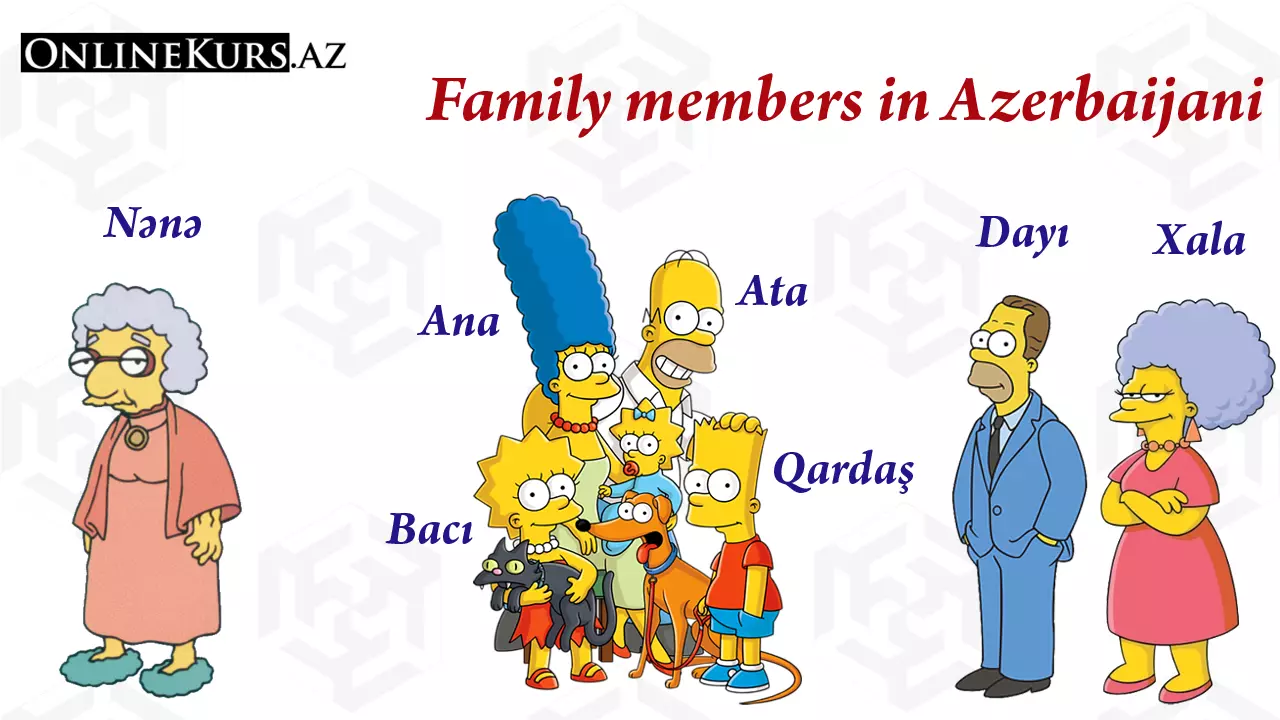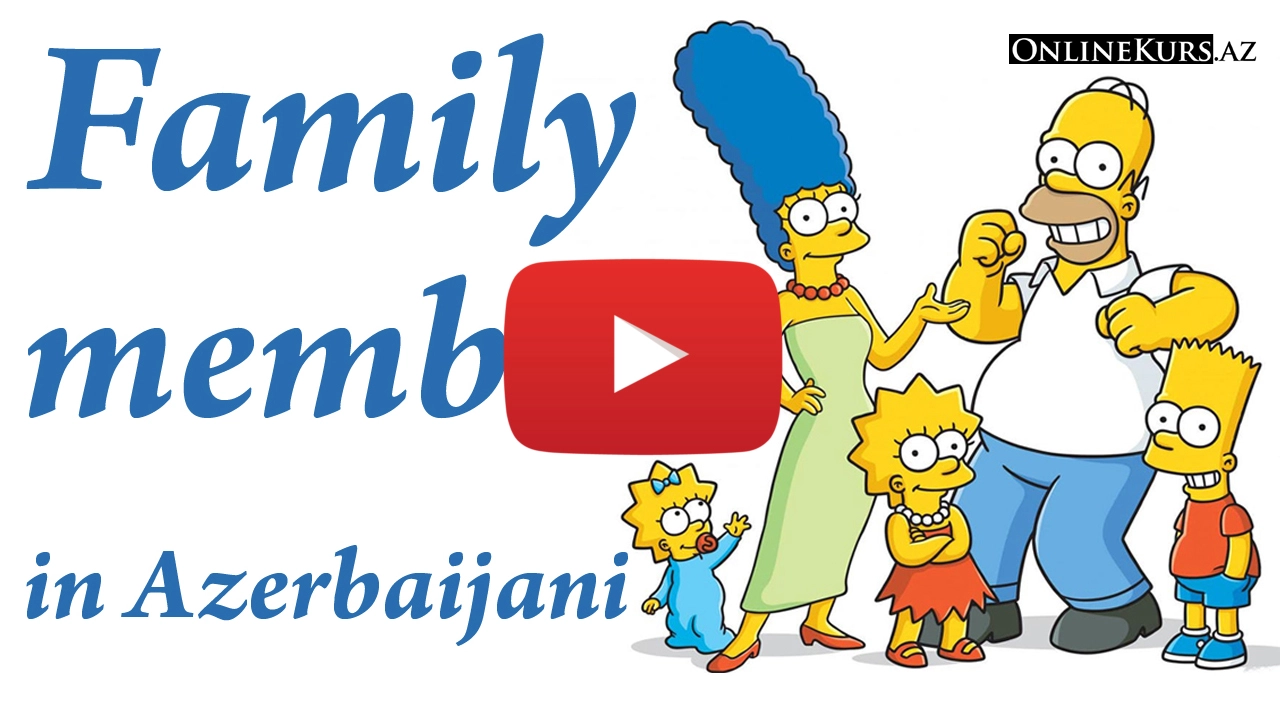Family members in Azerbaijani
The theme of family members and relatives in Azerbaijani is one of the important vocabulary lesson we must learn, because family, relatives and family ties is always relevant, because these are the closest people who surround us almost all our lives. Undoubtedly, something is constantly happening in the family: someone gets married, someone has children or grandchildren, someone breaks up, etc. In order to be able to talk about your family and relatives in the Azerbaijani language, it is very important have the necessary stock of Azeri words. This article presents the most common words and phrases about family members in Azerbaijani, which will help you freely express your thoughts on this topic.
Relatives in Azerbaijani
It is best to start a discussion of the topic of the family with close relatives in Azerbaijani. In Azerbaijani, close relatives are "yaxın qohumlar". If we are talking about great-grandmother, great-grandfather, great-grandson, great-granddaughter, and so on, we add another prefix before grand - great. For example: great-grandmother or great-grandson. In the Azerbaijani language, it is exactly the same - before the names of relatives, we add the word "ulu". For example: "ulu baba". More distant relatives in Azerbaijani sound like "uzaq qohumlar".
In the Azerbaijani language, as in any other, there are also affectionate appeals to close relatives. They are usually used only when relatives address each other. for example: "atacan" (daddy), "anacan" (mummy).
In English there are no separate words for brother-in-law, sister-in-law, etc. They are all called brother-in-law or sister-in-law. Or, if you, for example, introduce a friend to relatives, you can clarify: "This is my wife’s brother" or "This is my husband’s sister". The parents of a husband or wife are called mother-in-law and father-in-law. But in the Azerbaijani language, all these family members and relatives have their own names. In Azerbaijani husband's or wife's brother is called "qayın", and father-in-law is called "qayınana" and father-in-law - "qayınata". Son-in-law and brother-in-law in Azerbaijani is called "kürəkən" or "yeznə".
If we are talking about non-blood relatives, for example, a stepfather or stepmother, then such family members are called "ögey ana" or "ögey ata" in Azerbaijani. To compose a thematic story about a family members in Azerbaijani or discuss this topic, it will not be enough to know the names of relatives in Azerbaijani; you need to use phrases and constructions that are directly related to the theme of the family members and relatives in Azerbaijani.

In English, we call all our cousins just - cousin. But there is a confusing part of cousin names in Azerbaijani. The following words are commonly used by Azeris to refer to their cousins: "Əmi oğlu" - Son of my father's brother; "Əmi qızı" - Daughter of my father's brother; "Dayı oğlu" - Son of my mother's brother; "Dayı qızı" - Daughter of my mother's brother; "Bibi oğlu" - Son of my father's sister; "Bibi qızı" - Daughter of my father's sister; "Xala oğlu" - Son of my mother's sister; "Xala qızı" - Daughter of my mother's sister;
It is important to know, in addition to the names of relatives, also terms related to marriage. In a story about your family or just in a friendly conversation, you can use the following words: "İstədiyi oğlan" - boyfriend; "İstədiyi qız" - girlfriend; "Bəy" - bridegroom; "Gəlin" - bride; "Yoldaş" - spouse; "Boşanmış" - devorced; "Dul" - widow; "Nişanlı" - engaged; "Sevgili" - lover; "Evli" - married;
The prefix "keçmiş", which is used in Azerbaijani by family members such as "keçmiş arvad" (ex-wife), has a wider application. The same prefix is used, for example, in relation to politicians "keçmiş nazir" (a former minister).
Proverbs about family and relatives in Azerbaijani
Knowledge of Azerbaijani idioms and phrasal verbs will help expand your vocabulary and enrich your speech with expressions, without which fluent communication in the Azerbaijani language is impossible. They will help make your story about the family members in Azerbaijani more emotional and intense.
"Ağlarsa anam ağlar, başqası yalan ağlar." - If cries, my mother cries, someone else cries falsely. (The meaning of the proverb is that no one feels sorry for a person or care about him as much as his mother.)
"Ata olmayan - ata, ana olmayan - ana qədrini bilməz." - A person who is not a father and a person who is not a mother does not know the value of father or mother.
"Balam mənə əzizdir, tərbiyyəsi özündən də əzizdir." - My child is dear to me, his upbringing is dearer than himself. (An expression that is usually used to discipline a child when doing things which he doesn't likes even when beat him.)
"Ər ilə arvadın xəmiri bir yerdə yoğrulub" - The husband and wife knead the dough together. (This expression is used when a husband and wife have similarities in their characters.)
"Pis övlad altıncı barmaq kimidir - kəsərsən ağrıyar, kəsməzsən səni eybəcər göstərər." - A bad child is like a sixth finger - if you cut it, it hurts, if you don't cut it, it makes you ugly.
"Qadının gözəlliyi uşaq əlindəki silah kimidir - həm onun özü, həm də ətrafdakılar üçün təhlükəlidir. " - A woman's beauty is like a weapon in the hands of a child - it is dangerous both for herself and for those around her.
"Qızını döyməyən, dizini döyər." -He who does not beat his daughter, he will beets his knees.
Writing and pronunciation of family members and relatives names in Azerbaijani
|
|
Family |
|
|
Father |
|
|
Mother |
|
|
Brother |
|
|
Sister |
|
|
Son |
|
|
Daughter |
|
|
Parents |
|
|
Grandfather |
|
|
Grandmother |
|
|
Husband |
|
|
Wife |
|
|
Uncle |
|
|
Aunt |
|
|
Child |
|
|
Twins |
We believe that the education should be free and available to everybody. This is why some time ago, we made a decision to continue developing as a completely free network. But we need the support of our readers to continue creating new content, keep the development going and pay related expenses. If you like what we do and find it helpful, consider supporting us by making a donation.
